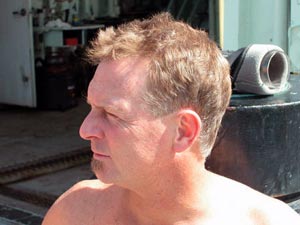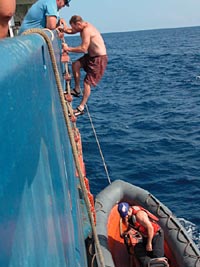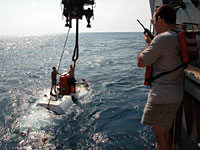|
|
Interviews: Chief
Steward Carl Wood
Carl
Wood’s title on RV Atlantis is Chief Steward.
But his real role on the ship includes so much more than
managing the kitchen (or galley) and ship supplies. A southern
California native, Carl loves to swim and can often be seen
in a bathing suit and flippers aiding in Alvin recoveries.
Blindfolded, you’d think the food he cooks came from
a high-powered gourmet restaurant. Think of him as one of Atlantis’ several
renaissance men.
CARL: As a steward, you’re in charge of making sure we have enough food when we set sail, and enough cleaning materials. You also need to make sure sanitation standards are being met, and that food preparation standards are being met. But with Al (the ship cook), his standards are so much higher than the official ones that you don’t have to worry much about that. QUESTION: It seems that you do a lot more than that description suggests, though. CARL: Yeah, I’ve been working with these people for more than 15 years. So, I proved myself pretty early on, and ever since then they’ve let me do my thing. The captain is my immediate boss. I deal with more of the programming issues, making sure things in the galley run smoothly. And I cook, of course. Al and I switch up meals, so that usually I spend more of the early time of the day working. That helps so I can swim with the Alvin crew in the afternoons. QUESTION: How do you figure out how much food to bring? CARL: You dummy up a menu that covers 4-6 months. You don’t stick to it day to day, of course, but that gives you a rough outline. A lot of it is math: You figure on sausage links twice a week, sausage patties twice, fish a certain number of dinners per week, and go from there. You figure on 48 people per meal. 35 steaks per meal, and so on. It’s not exact, but after a while you learn how to do it. I can order all the frozen and non-perishable food 4 months in advance. Then the perishable stuff – produce, some baking supplies – you order each port stop. The great thing is, WHOI gives me a lot of freedom with things like my budget. And the money can be averaged over a long period – four months -- so you can order tenderloin and shrimp if you’re smart about it. QUESTION: It amazes me that you can plan meals that far in advance. CARL: Well, you do the primary things first: strip sirloins, whole turkeys, things like that. Then, leftovers determine what we do with soups, casseroles, stir fries, barbecue sandwiches, things like that. I learned how to do this over 15 years. The one truly unique thing about working in this environment is that you can’t run out to the store if something’s missing or you don’t have enough. QUESTION: You could get away with cooking much less interesting meals than you do. People would be satisfied. But the food that you and Al cook is really original. Where do you get your ideas? CARL: I eat out 15 times a year. I’ve worked in kitchens since 1972. I took classes at the Culinary Institute of America. I look in newspapers, cookbooks. I remember things my mom made and try to recreate them. I ask one of my 21 friends on the boat; they think of things they haven’t had in years. The key for me is I use the best ingredients possible: heavy cream, real butter, extra virgin olive oil. And I know how to tweak things to give them a little something extra, with sauces, different vinegars, things like that. I have fun with all my ingredients.
CARL: I do whatever’s fun. I swim, I cook, I get out on the water. I was a competitive swimmer from age 8 to 16. On this ship I can travel the globe, see the world. And the people out here, we’re here for a reason. We like this life, we like where we’re at, we’re good at what we do. I’ve known a lot of them for 15 years. I’ve grown a lot as a person here, and this is where I’ll be ‘til I’m done. I’m at peace. I’m home. QUESTION: What about your life off the ship? CARL: That’s another thing living on a ship is good for: It occurred to me a while ago that I can live anywhere I like. I moved to southeastern Arizona because that’s where I’m happiest. I grew up in Escondido, which used to be farmland and a really neighborly kind of place, but now it’s changed so much, it’s gotten so overdeveloped, and it’s really not home anymore. Where I am now is pretty undeveloped, no one is in a hurry to do anything. It’s a free wilderness. I can go out my door, get in my kayak and go down the Colorado River and just be there, alone. The birds know me there. QUESTION: It’s interesting that you value wide open spaces but you enjoy life on a relatively small ship. There’s that “prison-like” feeling people talk about with life at sea. CARL: Yeah, but, you know, we’re in prison no matter where we are. There are walls and boundaries everywhere in life, limitations you set up or that are just there. You get rid of one, there’s another. So you have to learn to move around within that. On board, there are great people, great movies, books, the water. I’m very happy.
| ||||
Mailing List | Feedback | Glossary | For Teachers | About Us | Contact
© 2010 Dive and Discover™. Dive and Discover™ is a registered trademark of
Woods
Hole Oceanographic Institution



